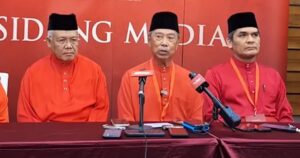
An opposition MP has urged the government to be decisive in implementing key policies, particularly as regards the rationalisation of RON95 petrol subsidies slated for the middle of this year.
In an exclusive interview with FMT, Machang MP Wan Ahmad Fayhsal Wan Ahmad Kamal said unclear policies risk undermining investor confidence. He said this, in turn, would have an adverse impact on the nation’s foreign and domestic direct investments.
“If (rationalising RON95 petrol subsidies) needs to be done because of a shortfall in the nation’s revenue, it has to be done properly. No flip-flop announcements.
“If the government wants to do unpopular things, just do it. Bite the bullet. March ahead and rally the people because this way, the rakyat can at least be prepared to face the challenges ahead,” he said.
Wan Fayhsal, a Bersatu Supreme Council member, said the foreign outflow of funds experienced by Bursa Malaysia over 26 consecutive weeks between October 2024 and the end of last month was “not a good indicated of market confidence”.
He warned that such trends could have negative repercussions on small and medium enterprises.
Wan Faysal said the blueprints and policy frameworks introduced under Prime Minister Anwar Ibrahim’s leadership were not being effectively communicated to civil servants or the public.
“The execution is not properly done and lacks clarity, and that’s why the money (foreign investiment) is not here. When you do not communicate your policy well, investors will hesitate to invest for the long run.
“We are ahead of our neighbouring countries when it comes to manufacturing semiconductors, but this is a historical legacy that was not born under Anwar‘s government,” he said.
The rationalisation of RON95 petrol subsidies, originally planned for 2024, has been postponed to mid-2025, drawing criticism from various quarters over a lack of clarity in its implementation mechanisms.
In October last year, economy minister Rafizi Ramli told Bloomberg the government was bracing for a public backlash over its plans to roll back petrol subsidies.
Last month, the Petrol Dealers Association of Malaysia called for clarity on various concerns over its implementation, including as to eligibility, the use of MyKad to identify qualifying recipients, and its costs and financial implications.
However, Rafizi said in March that the government had yet to determine how eligibility will be determined despite the Cabinet having reviewed four proposals.
It was previously reported that the government was in the midst of reworking the existing T15 income classification which would be announced by the first quarter of this year.
The T15 classification refers to the top 15% of income earners in Malaysia.
‘Deaf ears’
Wan Fayhsal claimed the government has also ignored complaints regarding a proposed electricity tariff hike.
“Trade associations complained to the prime minister and urged him not to raise the tariff yet because they are not ready for it, saying its implementation will impact their operations.
“I believe it fell on deaf ears,” he said.
In December, Tenaga Nasional Bhd proposed a new tariff schedule with a base rate of 45.62 sen per kilowatt-hour for Peninsular Malaysia, up from the current 39.95 sen/kWh, set to be implemented starting July 1, 2025.
In response, the Malaysia Shopping Malls Association warned that a potential increase in electricity tariffs, together with other rising operational costs, would place enormous financial pressure on both operators and consumers.
The Malaysian Iron and Steel Industry Federation, Malaysian Plastics Manufacturers Association and the Federation of Malaysian Manufacturers have also objected to the proposal and appealed to the government to reconsider the planned tariff hike.






